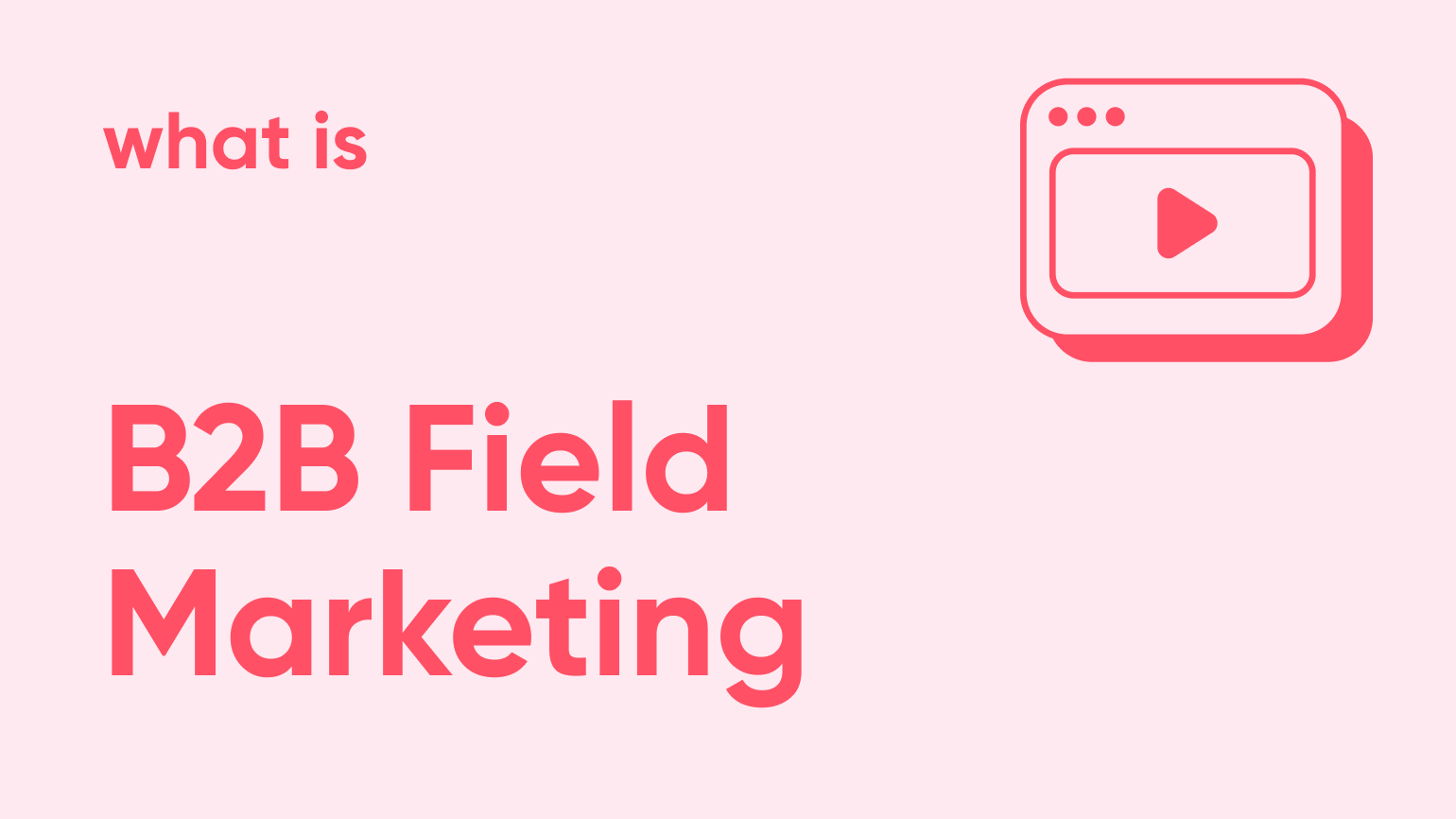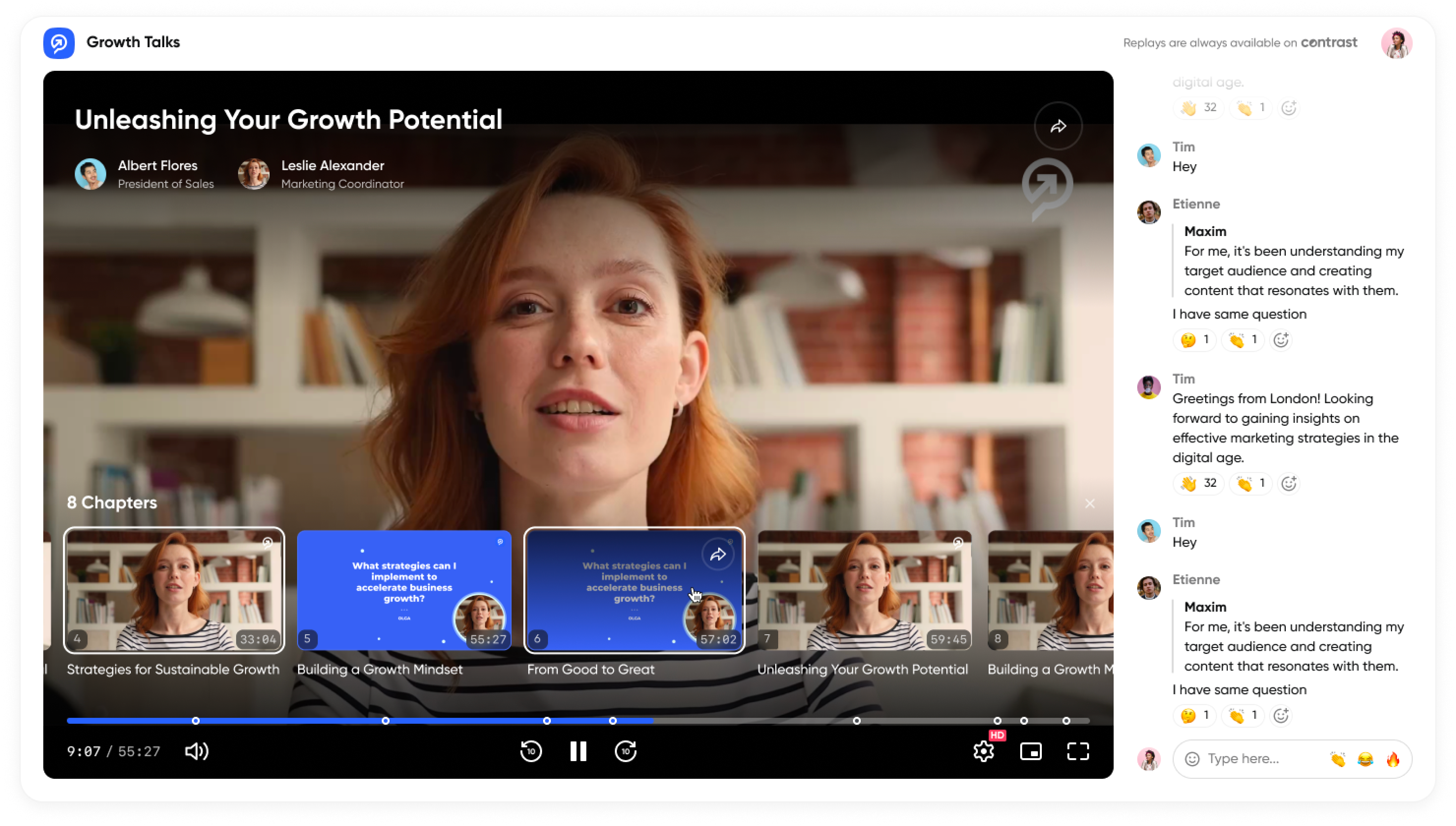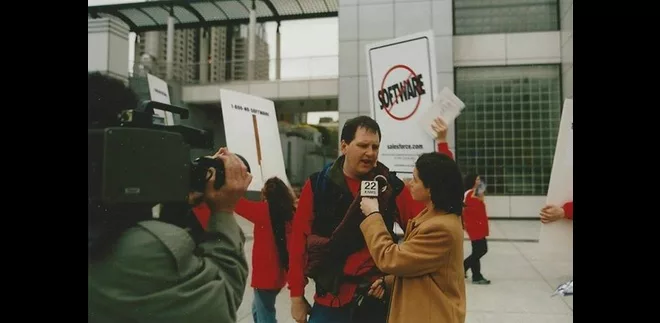What is Field Marketing in B2B?

Have you ever wondered what field marketing is? Well I definitely have. We see the term being thrown around a lot — and without a clear definition.
So we're going to do it, here and now.
The short answer?
Field marketing is the act of creating experiences "in the field", for possible customers to increase the effectiveness of future marketing or sales actions.
The long answer? We'll cover:
- An in-depth definition of field marketing
- Different types and examples of B2B field marketing
- Why it's worth investing in B2B field marketing
- How to align your efforts with sales teams for maximum impact
- Strategies to measure and optimize your results
Whether you're an expert or just getting started with field marketing, there'll be something for you.
What is Field Marketing in B2B?
B2B field marketing is a strategy that focuses on engaging with potential customers or clients directly in their own environment — or "in the field".
This usually involves meeting prospects face-to-face at industry events, trade shows, conferences, or through pop-ups, billboards, flyers, personalized experiences and presentations.
By interacting with potential clients in person, field marketers build stronger relationships, better understand their needs, and ultimately drive more sales.
Many people think field marketing is just about organizing webinars, events, participating in conveferences or even worse — just as sales support.
Unlike traditional marketing methods that rely on broad messaging and mass communication, field marketers tailor their approach to individual prospects. This personalized touch can be particularly effective in B2B, where purchase decisions often involve multiple stakeholders and require a deeper understanding of the product or service being offered.
At the end of the day, a field marketer's goal is to build strong relationships by connecting with, educating, and delighting potential customers through personalized face-to-face experiences.
What is a Field Marketer?
A field marketer collaborate closely with sales, demand generation, and product teams to manage effective events, messaging, and field campaigns that align with company objectives. They build marketing strategies to build pipeline, increase lead generation, and improve brand awareness.
Field marketers are also responsible for building and maintaning brand positioning and representing it in-person — allowing better communication with potential buyers.
Other responsibilities include reporting on the effectiveness of field marketing activities through tagging and attribution in the CRM, and ROI calculations.
How to Measure the Success of a Field Marketer?
By definition, field marketers use a mix of online and offline strategies to help build pipeline, generate leads, and improve brand awareness. But this means that it can be difficult to measure the success of field marketing initiatives.
So whenever they can track the success of their campaigns (like events and webinars) they make sure to use platforms with detailed analytics that they can integrate with other tools like their CRM. For other KPIs, field marketers can refer back to baseline level comparisons.

Field marketers' Favorite Webinar Tool
Start for free with up to 30 registrants. No credit card needed.
Start for freeBenefits of Field Marketing in B2B
- Forge stronger relationships with clients through face-to-face interactions
- Generate high-quality leads by targeting specific decision-makers
- Boost brand visibility and credibility through real-world demonstrations
Building Personal Relationships
Field marketing allows B2B companies to engage with potential clients on a personal level. Face-to-face interactions at events, trade shows, or targeted meetings help establish trust and credibility. These personal connections are crucial in B2B sales, where decision-making processes are often lengthy and complex.
By meeting clients in person, field marketers can better understand their unique challenges and tailor solutions accordingly. This level of personalization is difficult to achieve through digital marketing alone. In-person conversations also provide opportunities to address concerns and objections in real-time, increasing the likelihood of converting leads into customers.
The Power of Face-to-Face Communication
Studies have shown that face-to-face communication is more effective than digital interactions in building trust and forming lasting relationships. A study by the Harvard Business Review found that in-person requests were 34 times more successful than email requests. This highlights the importance of field marketing in B2B, where building strong relationships is key to securing long-term partnerships.
Generating High-Quality Leads
B2B companies use field marketing to target specific industries or decision-makers, making lead generation efforts more focused and effective. By attending industry-specific events or hosting targeted workshops, field marketers can attract prospects who are more likely to convert into customers.
In-person interactions also allow field marketers to qualify leads on the spot. They can ask probing questions to determine whether a prospect fits their ideal customer profile and has the authority to make purchasing decisions. This level of qualification is difficult to achieve through online lead generation forms or cold calling.
Targeted Account-Based Marketing
Field marketing is particularly effective when combined with account-based marketing (ABM) strategies. ABM involves identifying and targeting high-value accounts that are most likely to generate significant revenue. By leveraging field marketing to engage with decision-makers at these accounts, B2B companies can accelerate the sales process and increase conversion rates.
For example, a study by ITSMA found that ABM programs resulted in a 28% increase in revenue.
Increasing Brand Awareness
Field marketing provides opportunities to showcase products or services in real-world settings as well as creating memorable experiences. By demonstrating how their offerings solve specific challenges and the uniqueness of their brand, B2B companies can increase brand awareness and position themselves as industry leaders.
Trade shows and conferences are excellent venues for field marketing. These events attract a targeted audience of potential clients who are actively seeking solutions in your industry. By hosting engaging booth displays, delivering informative presentations, or participating in panel discussions, field marketers can establish their company as a trusted resource and thought leader.
Experiential Marketing Tactics
To stand out in crowded exhibition halls, B2B field marketers often use experiential marketing tactics. These may include interactive product demonstrations, virtual reality experiences, or gamified challenges that showcase the company's offerings in a memorable way. For instance, Cisco Systems used a virtual reality experience to showcase their cybersecurity solutions at a trade show. By creating immersive experiences, field marketers can leave a lasting impression on potential clients and differentiate their brand from competitors.
Supporting Sales Teams
Field marketers can also support B2B sales teams. They work closely with sales reps to identify and qualify leads, show product demos, and set up & attend client meetings. This collaboration ensures that sales and marketing efforts are aligned and focused on driving revenue growth.
By providing valuable insights into customer needs and preferences, field marketers help sales teams tailor their pitches and close deals more effectively. They may also create targeted marketing collateral, such as case studies or product sheets, to support the sales process.
Sales Enablement Resources
To maximize the impact of field marketing efforts, B2B companies should develop a robust library of sales enablement resources.
These may include:
- Product demos and videos
- Case studies highlighting successful client implementations
- Battle cards comparing your offerings to competitors
- Customizable presentation decks for various industries or personas
By equipping field marketers with these resources, companies can ensure that their messaging is consistent and persuasive across all client interactions.


Turn Every Webinar into 10+ Pieces of Content
Start for free with up to 30 registrants. No credit card needed.
Start for freeBest Field Marketing Strategies
From what we've covered you can already tell that there's a ton of ways to do field marketing — all centered around creating great in-person experiences for potential clients to build relationships and drive leads and pipeline in the future.
So how do they do it? Let's cover some of the best & most common field marketing strategies.
Virtual events
Virtual events are one of field marketer's favorite tools in their toolkit. They offer a way to engage large audiences without having to worry about geographic constraints and at a much lower cost.
Modern webinar tools offer a set of features to create a strong relationship with audience members around the world all while making sure to create branded and visually pleasing experiences. They're a powerful lead generation tool that allows field marketers to gain a lot of insights into their audience, either through registration forms, polls, chat messages, or 1:1 interactions.
Webinars are also a great way to create high-quality content that can be repurposed into many other types of content — fueling the marketing team's content strategy for weeks.

In-Person Events
In-person events are another staple of field marketing, focusing on building relationships and achieving specific sales and marketing goals. Unlike virtual events, in-person events are about direct interaction.
Field marketers concentrate on promoting and executing event campaigns before, during, and after the event. They look for opportunities to build relationships, whether by hosting events or participating in major trade shows like HubSpot's Inbound.
Events can range from large trade shows to small, informal gatherings. The focus is on the outcomes, such as generating leads or closing sales, rather than the event itself.
Sales and field marketers will often collaborate on events of all sizes.
Product Demos
Product demonstrations are often seen at trade show events. The goal is to interact with potential customers directly, though the objectives can vary depending on the product and target market.
A common example is a food or beverage company giving out free samples at a supermarket or community event. Here, the aim is usually to encourage immediate purchases since these items are typically low-cost and don't require much consideration.
In the B2B world, software vendors might show short, impactful demos of key features to build relationships with buyers, aiming for introductions to buyers or generating new leads.
Content libraries
On-demand content libraries are a crucial resource, providing on-the-go access to leads, prospects and clients to whitepapers, case studies, brochures, videos, and presentations. Field marketers can use them to create consistent, high-quality messaging during face-to-face interactions.
These libraries mean field marketing teams have immediate access to the latest resources, addressing customer questions and objections effectively. For example, during a demo at a trade show, a field marketer can quickly pull up a relevant case study or product spec sheet from the content library to provide detailed information and reinforce their pitch.
Content libraries also help with the personalization of marketing. By understanding which materials are most frequently accessed, marketers can adapt strategies to meet the needs and interests of their audience. This data-driven approach allows for more meaningful interactions, as field marketers can present content that resonates with potential customers' specific concerns and interests.

Guerrilla Marketing
Guerrilla marketing, coined by Jay Conrad Levinson, focuses on creative, low-cost strategies to make a big impact. The key principles include investing time, energy, and imagination instead of money, and fostering long-term relationships with customers.
Guerrilla campaigns often use the existing environment to create unique and memorable experiences. The idea is to do something novel that gets people talking about your brand. While cost-effective, this approach requires more creativity and mental effort than typical marketing campaigns.
Salesforce famously put on one of the most famous B2B Guerrilla marketing stunts with their 'End of Software' demonstration — claiming that the era of enterprise software was over and the future belonged to internet services.
They did it right outside Siebel Systems' user conference. 'Protestors' held large signs with anti-software messages and chanted slogans, capturing the attention of conference attendees as they walked by.

What Makes an Effective Field Marketing Strategy?
Although there are hundreds of ways of doing field marketing, they all rely on the same foundations. Let's look at what makes an effective field marketing strategy:
Understanding Your Audience
First things first, you need to really understand who you’re targeting. Because field marketing isn’t about casting the widest net possible — it’s about creating meaningful, personalized, 1:1 interactions.
For example, if you want to attract high-level C-suite executives or board members, planning an event in a run-down comedy club might not be the best option.
Looking to attrack high-level execs? A VIP networking dinner might be more appropriate.
And for junior employees? A fun workshop event might be more relevant.
Setting Clear Goals
This might sound like basic advice... but it’s crucial.
So many field marketing campaigns fail because they aren’t well-planned or are irrelevant when it comes to broader marketing and sales strategies.
Some key questions you want to ask:
- Who is your target audience?
- Are they familiar with your brand?
- What key points should you address to push deals forward?
- How are we going ot get the mto convert?
Learn what your sales team is doing in the market and try to apply similar strategies to improve the results of field marketing campaigns.
Developing Tailored Content
Previously we talked about how inviting different members of your audience to the same event won't cut it — it's the same for content.
Your content needs to be different to target different audience segments.
Work with your marketing team to create customizable templates that can be quickly adapted to suit the needs of different types of prospects across your target audience.
Collaborating deeply with marketing and sales is the best way to make sure your messaging is relevant and impactful.
Collaborating Across Teams
Field marketing is a team game. It doesn't work any other way.
Bringing together product marketing, general marketing, content, and sales teams to craft region-specific, stage-specific, use-case-specific campaigns puts the buyer at the center of your strategy.
Though difficult to track, field marketing campaigns should be as data-driven as your online efforts. All marketing activities—whether virtual or physical—are interconnected. Data is the best way to create optimal experiences.
The Power of Field Marketing
Field marketing is a powerful tool for B2B companies looking to build personal relationships, generate high-quality leads, and increase brand awareness. By engaging with potential customers in their own environment, field marketers establish trust, credibility, and ultimately drive sales.
In field marketing, alignment with overall sales and marketing activities is crucial. Successful campaigns require a deep understanding of your audience, clear goal setting, and tailored content. By working collaboratively and using data to inform your strategies, you can create impactful, buyer-focused campaigns that drive results both online and offline.
Field marketing can be your next high-value growth lever, if you're doing it right.

Engaging Webinars your Audience will Love
Start for free with up to 30 registrants. No credit card needed.
Start for free